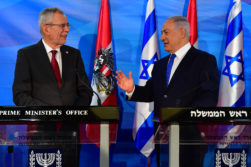
PM Netanyahu and Austrian Pres. Alexander Van der Bellen. Photo courtesy of Kobi Gideon (Israeli GPO)
After pulling out of the Iran nuclear deal last year, the United States implemented renewed sanctions on Iran in an effort to change their malignant behavior ranging from missile tests to terrorism. While European nations have reportedly been looking at ways to evade the sanctions to try and keep Iran in the endangered nuclear arrangement, one central European country hasn’t been so eager to buck the American pressure on Iran and Israel wants to keep it that way.
Austria refused to host discussions on the economic creativity seeking to get around Iran sanctions—known as a Special Purpose Vehicle (SPV)—and Israeli Prime Minister Benjamin Netanyahu commended their European ally for taking that position in comments with visiting Austrian President Alexander Van der Bellen on Tuesday. Netanyahu’s comments with the Austrian official come a week after Austrian Foreign Minister Karin Kneissl discussed European-Iranian trade with an Iranian diplomat in Vienna, according to the Mehr News Agency.
Netanyahu told Van der Bellen, in comments released by the Israeli’s office, that this “is an area that I’d like to discuss further with you, something that we have obviously very strong opinions about.”
“But I believe that we share a common goal,” he continued. “And I believe that that common goal was probably in the note you put in the Western Wall, your prayers for the future. I’m guessing that our hopes for the future, our prayers for the future are for peace and harmony and security and prosperity.”
The opposite end of that peaceful spectrum for Israel is where Iran is today—and not just with the nuclear threat. “We have a great challenge from Iran that openly calls for our destruction. It minces no words about this,” said Netanyahu. “We’re committed to preventing their acquisition of nuclear weapons which would be directed at us, but we’re also committed to preventing their aggression in Syria.”
To that end, Netanyahu noted that he has plans to visit Russian President Vladimir Putin later this month to discuss Israel’s anti-Iran actions in Syria. “It’s very important that we continue to prevent Iran from entrenching in Syria. In many ways we’ve blocked that advance and we’re committed to continue blocking it, preventing Iran from creating another warfront against us, right here [on the northern border] opposite the Golan Heights.”
Iran’s virulent anti-Israel rhetoric is not just a point of interest for the country that has reimposed sanctions on Iran. US President Donald Trump, during his State of the Union address on Tuesday, specifically highlighted this concern. “We will not avert our eyes from a regime that chants ‘Death to America’ and threatens genocide against the Jewish people,” Trump told Congress in his speech, which was published on the White House website. “We must never ignore the vile poison of anti-Semitism, or those who spread its venomous creed. With one voice, we must confront this hatred anywhere and everywhere it occurs.”
Trump also pointed to his decision to withdraw from the Iran nuclear accord last year as an achievement for 2018.
“My administration has acted decisively to confront the world’s leading state sponsor of terror: the radical regime in Iran. It is a radical regime. They do bad, bad things,” said Trump. “To ensure this corrupt dictatorship never acquires nuclear weapons, I withdrew the United States from the disastrous Iran nuclear deal. And last fall, we put in place the toughest sanctions ever imposed by us on a country.”
While key partners in Europe don’t view Trump’s actions against Iran as a positive, Austria, at least so far, hasn’t made the sanctions-busting as easy as possible. Israel hopes that continues.
(By Joshua Spurlock, www.themideastupdate.com, February 6, 2019)
